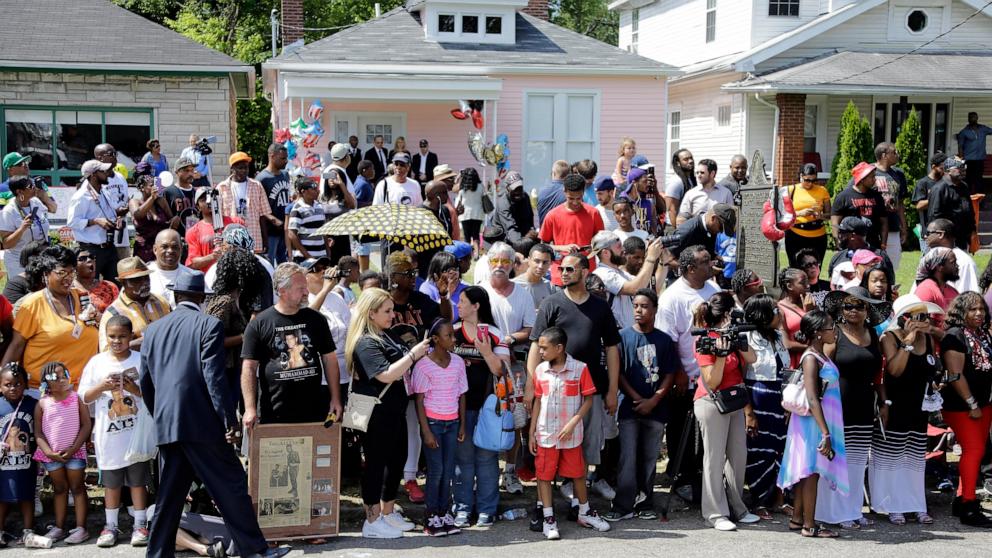The pink house where Muhammad Ali grew up dreaming of boxing fame is for sale
LOUISVILLE, Ky. — The pink house where Muhammad Ali grew up dreaming of boxing fame is for sale, and decades later, hundreds of fans gathered for an emotional send-off as his funeral procession passed by.
A two-bedroom, one-bathroom Louisville home that has been converted into a museum offering a glimpse into the formative years of the boxing champion and humanitarian known worldwide as “The Greatest” went on the market Tuesday along with two other nearby homes: one that will be converted into a welcome center and gift shop, the other that will be used for short-term rentals.
The owners are asking $1.5 million for the three properties, and the “best-case scenario” would be to find a buyer willing to keep Ali's childhood home as a museum, co-owner George Bochetto said.
“This is part of American culture,” said Bochetto, a Philadelphia lawyer and former Pennsylvania state boxing commissioner. “It's part of our history, and it needs to be treated and respected as such.”
The museum opened for tours shortly before Ali's death in 2016. Bochetto and his then-business partner renovated the wooden house to look just like it did when Ali (then known as Cassius Clay) lived there with his parents and brother.
“When you walk into this house, you feel like you're transported back to 1955 and you're in the middle of the Clay family home,” Bochetto told The Associated Press in a 2016 interview.
Developers used old photographs to recreate the furniture, appliances, artwork and even the pink exterior of the house from Ali's time. The museum showed videos that focused on Ali's early life story rather than his illustrious boxing career.
“To me, that's the bigger story, the more important story,” Bochetto said in an interview last week.
Ali first started boxing after his bike was stolen. Wanting to report the incident, 12-year-old Ali was introduced to Joe Martin, a police officer who also worked as a boxing coach at a local gym. Ali told Martin that he wanted to beat up the culprit. Neither the culprit nor his bike were ever found, but Ali became a regular at Martin's gym.
Ali lived in the house when he returned to compete in the 1960 Olympics, and upon his return as a gold medalist, he launched a career that would make him one of the world's best-known figures as a three-time heavyweight boxing champion and globetrotting humanitarian.
On the day of Ali's burial, the house attracted worldwide attention as hundreds of people lined the street outside the house as the hearse and funeral procession slowly passed by.
Despite its much-anticipated debut, the museum ran into financial difficulties and closed less than two years after opening. Located in Louisville's West Side neighborhood, a few miles from downtown Louisville, the Muhammad Ali Center preserves Ali's humanitarian and boxing legacy.
As efforts to reopen the childhood museum stalled, Bochetto said he also had rejected offers to move the 1,200-square-foot (111-square-meter) home to Las Vegas, Philadelphia and even Saudi Arabia.
“I wouldn't do that because I think it's an important part of Louisville history, Kentucky history, and it needs to be left in place,” he said.
Las Vegas real estate investor Jared Weiss bought Ali's childhood home, then dilapidated and vacant, for $70,000 in 2012 with plans to restore it. Three years later, Weiss partnered with Bochetto, who took a half-equity stake in the project. Both men were huge Ali fans and spent hundreds of thousands of dollars on the restoration project. The pair also bought two adjacent homes, funded the documentary, subsidized the museum's operating costs and covered the costs of all three properties. Weiss has since died, and his wife is co-owner of the project, Bochetto said.
Now, Bochetto said he hopes to find a buyer with the “marketing and operational know-how” to make the museum a success.
“I want to make sure that this facility continues to exist in this way and does not go back into a state of abandonment and disrepair,” he said. “That should never have happened.”

